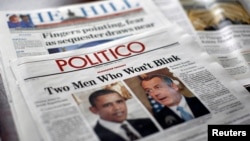WHITE HOUSE —
President Barack Obama went to a shipbuilding factory Tuesday to warn that the U.S. government spending cuts to take effect Friday will weaken the nation’s defense. The political battle over the so-called “sequester” shows no signs of a settlement.
Three days before the $85 billion in automatic budget cuts go into force, Obama continued his public campaign to pressure Republicans in Congress to stop them.
He visited Newport News Shipbuilding, the largest industrial employer in the state of Virginia, to make his point.
Obama said the impact of the cuts will not be felt immediately, but it will be widespread.
“The sequester will weaken America’s economic recovery," he said. "It will weaken our military readiness. And it will weaken the basic services that the American people depend on every single day.”
White House officials said the cuts could affect many areas of government services, including air traffic control, food inspection and the nation’s defense.
The Pentagon would absorb $46 billion of the spending reductions.
The uniformed leaders of the five military branches - the Joint Chiefs of Staff - testified before Congress Tuesday that cuts in the Pentagon budget will put national security at risk.
While the president urged lawmakers to compromise to avoid the cuts, there was no sign that the two parties are negotiating.
Obama’s last known conversation with top Republicans was last week, and they have not met this week.
Instead of the sequester, the president wants a series of targeted cuts combined with tax increases to reduce the federal deficit.
“The reason that we are even thinking about the sequester is because people are rightly concerned about the deficit and the debt. But there is a sensible way of doing things and there is a dumb way of doing things,” Obama said.
Republicans say they agreed to higher taxes in the last deal, and that the savings this time should come from lower spending.
Speaker of the House John Boehner said Tuesday the president is more concerned with politics than with preventing a budget crisis.
“I do not think the president is focused on trying to find a solution to the sequester," he said. "The president has been traveling all over the country, and today, going down to Newport News in order to use our military men and women as a prop in yet another campaign rally to support his tax hikes.”
The automatic cuts were designed to take effect if a congressional super-committee failed to approve at least $1 trillion in savings in the federal budget. While they were intended to be politically unacceptable to both parties, neither side appears willing to compromise.
Three days before the $85 billion in automatic budget cuts go into force, Obama continued his public campaign to pressure Republicans in Congress to stop them.
He visited Newport News Shipbuilding, the largest industrial employer in the state of Virginia, to make his point.
Obama said the impact of the cuts will not be felt immediately, but it will be widespread.
“The sequester will weaken America’s economic recovery," he said. "It will weaken our military readiness. And it will weaken the basic services that the American people depend on every single day.”
White House officials said the cuts could affect many areas of government services, including air traffic control, food inspection and the nation’s defense.
The Pentagon would absorb $46 billion of the spending reductions.
The uniformed leaders of the five military branches - the Joint Chiefs of Staff - testified before Congress Tuesday that cuts in the Pentagon budget will put national security at risk.
While the president urged lawmakers to compromise to avoid the cuts, there was no sign that the two parties are negotiating.
Obama’s last known conversation with top Republicans was last week, and they have not met this week.
Instead of the sequester, the president wants a series of targeted cuts combined with tax increases to reduce the federal deficit.
“The reason that we are even thinking about the sequester is because people are rightly concerned about the deficit and the debt. But there is a sensible way of doing things and there is a dumb way of doing things,” Obama said.
Republicans say they agreed to higher taxes in the last deal, and that the savings this time should come from lower spending.
Speaker of the House John Boehner said Tuesday the president is more concerned with politics than with preventing a budget crisis.
“I do not think the president is focused on trying to find a solution to the sequester," he said. "The president has been traveling all over the country, and today, going down to Newport News in order to use our military men and women as a prop in yet another campaign rally to support his tax hikes.”
The automatic cuts were designed to take effect if a congressional super-committee failed to approve at least $1 trillion in savings in the federal budget. While they were intended to be politically unacceptable to both parties, neither side appears willing to compromise.




